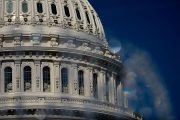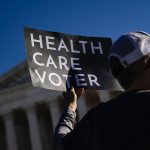After a federal court decided that HIV prevention medication does not need to be covered under the Affordable Care Act, experts fear that many other reproductive health services — screening for sexually transmitted infections, breastfeeding counseling and even contraceptive care — could now be threatened.
The ruling’s scope — including the nuances of how it could affect people’s insurance plans — will be addressed at a hearing Friday. If upheld, the case could ultimately reverse one of the most significant reforms established by the ACA, with particular impact on the law’s gender-based health protections.
“It would be devastating,” said Katie Keith, a health law expert at Georgetown University.
The decision, which was issued last week by a district judge in Texas, has not yet taken any effect or changed anyone’s insurance. At the hearing Friday, Judge Reed O’Connor will ask both sides to provide arguments for how his ruling should be enforced and discuss whether insurance must continue to fully cover contraception.
The case concerns an ACA provision requiring health insurance to cover certain preventive medical services with no out-of-pocket costs. Those benefits are picked by three federal bodies: the U.S. Preventive Services Task Force, the Health Resources and Services Administration, and the Advisory Council on Immunization Practices. Benefits include a daily pill taken for HIV prevention — known as pre-exposure prophylaxis (PrEP), which is 99 percent effective — as well as at least one version of each method of contraception.
The plaintiffs, a group of employers, argued that the U.S. Constitution does not allow the government to let those three bodies determine which medical services are covered. They also argued that they should not have to provide insurance covering PrEP and contraception, because doing so violated their religious beliefs.
Last week, O’Connor, who has previously issued decisions that would weaken the ACA, ruled partially in favor of the plaintiffs.
In his decision, he struck down the requirement that insurance cover, without cost-sharing, the benefits that are recommended by the U.S. Preventive Services Task Force. Those include HIV screening, chlamydia and gonorrhea screenings, breastfeeding support, mental health interventions for pregnant and postpartum people, and extra counseling and treatment for people at higher risk of breast cancer. The ruling did not address contraceptive benefits, which are not determined by the Preventive Services Task Force
Separately, O’Connor also ruled that the plaintiffs should not be required to cover PrEP if they felt that doing so violated their religious beliefs.
Neither the impact of the ruling nor its timing is clear. Following Friday’s briefing, O’Connor could limit his ruling only to affect the plaintiffs so that only they, and anyone else who files similar lawsuits, would be exempt from the ACA requirements. He could issue a nationwide injunction, blocking the affected ACA requirements for health plans more broadly.
“It’s a question of the scope,” said Laurie Sobel, associate director of women’s health policy at the nonpartisan Kaiser Family Foundation. “In the past, Reed O’Connor has not been shy about issuing national injunctions.”
It is not clear how long after Friday’s hearing O’Connor will issue a decision, or what the next steps might be. The list of benefits that could be affected is extensive.
“Are you really going to drop depression services? Screening for pregnancy and diabetes?” Sobel said.
In his ruling last week, O’Connor did not address litigants’ religious objections to covering contraception, instructing them to address that at Friday’s briefing. That means O’Connor could issue a decision weakening that protection, potentially striking down entirely the ACA requirement that birth control be covered with no cost-sharing.
-
Read Next:
The Supreme Court has already issued rulings that severely weakened the contraceptive mandate, allowing employers with religious and moral objections to opt out of providing that benefit.
Because health insurance plans are already being set for next year, and because it’s not yet clear what policy O’Connor will order, the case will not immediately change anyone’s health insurance. If O’Connor issues an injunction, the federal government is also likely to appeal the case, which would first go to the U.S. Court of Appeals for the 5th Circuit — considered the most conservative appeals court in the country — and then to the Supreme Court.
The Supreme Court, which has shifted to the right, may also be more willing than it was a few years ago to issue a ruling that significantly weakens the preventive services coverage mandate. A decision could come this fall through the high court’s so-called “shadow docket,” Sobel said. That refers to a process in which the court issues often-major decisions outside the timeline and scrutiny of the normal Supreme Court calendar.
If that happened, health insurance plans could try to change their benefits before 2023, but the larger impact would likely emerge the following year. It’s difficult to know what benefits plans might drop if they are no longer required to offer them. But the impact could be significant.
“You’re going back to the pre-ACA world,” Keith said. The preventive services mandate “is one of the most popular and widely recognized benefits of the ACA. It’s been 12 years that it’s been in place. It’s maybe not the heart of the ACA, but it’s a pretty core and highly visible part.”







